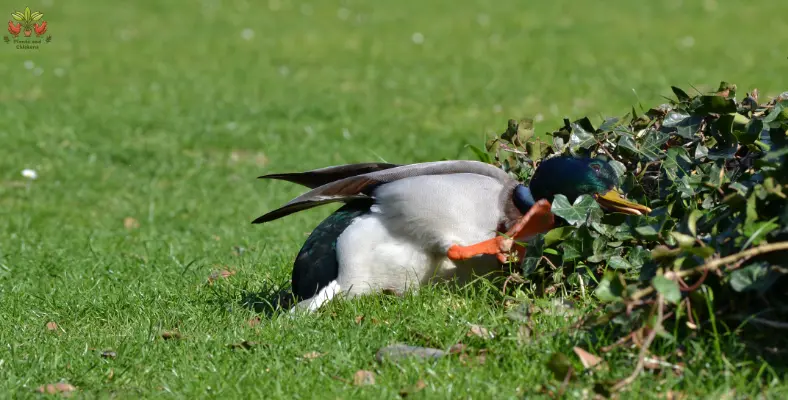A duck may be falling over due to various reasons such as niacin deficiency, muscle weakness, inner ear infection, poisoning, respiratory illness, selenium deficiency, back deformity, or injury to the back or neck. It is important to address the underlying cause and provide appropriate care and treatment for the duck to regain its balance.
Table of Contents
Understanding The Issue
If you notice that your duck is falling over and having difficulty maintaining its balance, it is important to understand the signs and symptoms associated with this issue. Some of the common signs that indicate your duck is falling over include:
- Loss of balance
- Difficulty standing up
- Stumbling or tripping frequently
- Falling onto its back
There can be various reasons why is my duck falling over. It is essential to identify the possible causes in order to provide appropriate care and treatment. Some of the potential causes include:
Identifying the underlying cause of your duck’s falling over is crucial for appropriate treatment and prevention of further complications. Consulting a veterinarian is recommended to accurately diagnose the issue and provide the necessary care.
Preventive Measures
Falling over is a common issue faced by many duck owners. However, there are preventive measures you can take to ensure the well-being and stability of your ducks. By focusing on housing and environment, nutrition and hydration, as well as exercise and enrichment, you can help your ducks maintain balance and avoid falling over.
Housing And Environment
Provide a spacious and safe living space: Ducks require ample room to move around and stretch their wings. Make sure their housing is large enough to accommodate their size and allows them to walk and swim comfortably.
Ensure proper flooring: Use non-slip flooring in their living area to prevent accidental slips and falls. This can be achieved by using rubber mats or installing textured surfaces.
Monitor temperature and humidity: Ducks are sensitive to extreme temperatures and high humidity levels. Maintain suitable climate conditions by providing proper ventilation and insulation to their housing.
Nutrition And Hydration
Provide a well-balanced diet: Ducks require a nutrient-rich diet that includes adequate amounts of protein, carbohydrates, fats, vitamins, and minerals. Consult with a veterinarian or poultry nutritionist to ensure you are feeding your ducks the appropriate feed.
Include necessary supplements: Ducks may require additional supplements to support their overall health. Niacin, vitamin D, and calcium supplements can help prevent deficiencies and promote strong bones and muscles.
Ensure access to fresh water: Ducks need access to clean and freshwater at all times. Make sure to provide a suitable water source that is easily accessible for them to drink from and bathe in.
Exercise And Enrichment
Encourage regular exercise: Ducks need opportunities to exercise and stretch their muscles. Provide them with a secure outdoor area or an enclosed pond where they can swim, walk, and forage.
Offer enrichment activities: Ducks are intelligent and curious animals. Stimulate their minds and keep them engaged by providing toys, puzzles, and foraging opportunities. This will not only prevent boredom but also promote physical activity.
By implementing these preventive measures, you can minimize the risk of your ducks falling over and ensure they lead healthy and balanced lives. Remember to regularly monitor their behavior and overall well-being to address any potential issues promptly.

Seeking Veterinary Care
When your duck is experiencing difficulty and falling over, seeking veterinary care is crucial to diagnose the underlying cause and provide appropriate treatment. Professional veterinary assistance can identify the specific issue affecting your duck’s stability and implement necessary steps to help them regain their balance and health.
Diagnosis And Treatment
Upon seeking veterinary care, the veterinarian will conduct a thorough examination of your duck to determine the cause of falling over. They may perform various diagnostic tests such as:
- Blood tests to analyze nutrient deficiencies or infections.
- X-rays to assess any potential structural abnormalities or injuries.
- Neurological evaluations to check for issues related to nerve function.
Once a diagnosis is made, the veterinarian will develop a treatment plan tailored to your duck’s specific condition. This may include:
- Medications to address infections or inflammation.
- Supplements to correct nutrient deficiencies, such as niacin or selenium.
- Physical therapy or rehabilitation exercises to improve muscle strength and coordination.

Credit: www.ebay.com
Follow-up And Management
After the initial diagnosis and treatment, it is important to follow any recommendations provided by the veterinarian. Regular follow-up visits should be scheduled to monitor your duck’s progress and make any necessary adjustments to the treatment plan.
In addition, the veterinarian may advise specific management practices to support your duck’s recovery and prevent future episodes of falling over. These may include:
- Providing a safe and comfortable environment to minimize stress and promote healing.
- Adjusting the duck’s diet to ensure proper nutrition and address any deficiencies.
- Implementing preventive measures to reduce the risk of infections, including clean water sources and proper hygiene.
By closely following the veterinarian’s guidance, you can help your duck regain their stability and improve their overall well-being.
Frequently Asked Questions For Why Is My Duck Falling Over
Why Is My Duck Stumbling Around?
The most common cause of ducks stumbling around is niacin deficiency. Ducks cannot convert amino acids like chickens can, so they need a niacin-rich diet. Additionally, inner ear infections or muscle weakness can also cause instability. Providing a safe area for rest and a diet rich in calcium and vitamin D can help.
Why Is My Duck Having Trouble Standing?
The most common reason for a duck having trouble standing is niacin deficiency, which occurs when ducklings are fed chicken rations. This deficiency can lead to muscle weakness. Another possibility is an inner ear infection or muscle weakness, which can be treated with medications prescribed by a vet.
Providing a quiet area for rest and a diet rich in calcium and vitamin D can also help.
Why Is My Duck Unstable?
The most common cause of a duck being unstable is niacin deficiency, which occurs when they are fed rations meant for chickens, as ducks cannot convert amino acids into niacin as chickens can. Other possible causes include inner ear infection, muscle weakness, poisoning, or respiratory illness.
Providing a safe, quiet area, a diet rich in calcium and vitamin D, and extra heat may help. It is important to consult a vet for proper diagnosis and treatment.
Why Is My Duck Just Laying Down?
A possible reason why your duck is laying down could be a niacin deficiency, common in ducks when fed chicken rations. Provide a diet rich in calcium and vitamin D and consult a vet if the issue persists.
Conclusion
If you find your duck falling over, there are several possible causes. Niacin deficiency is a common issue when ducklings are fed chicken rations. Inner ear infections, muscle weakness, and poisoning are also potential reasons for instability. Respiratory illnesses and selenium deficiency can also lead to ducks laying down.
While some cases may require veterinary intervention, minor injuries, bumblefoot, or niacin deficiency can be easily addressed. By understanding the root cause, you can provide the necessary care and support to ensure your duck’s well-being.


![Terrifying Trend: Why Do Roosters Chase Humans? [2024]](https://plantsandchickens.com/wp-content/uploads/2024/02/why-do-roosters-chase-humans-4.webp)


Leave a Reply